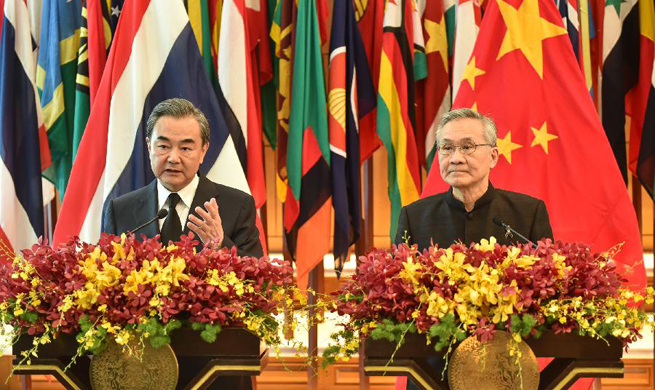SEOUL, July 25 (Xinhua) -- The new South Korean government under President Moon Jae-in on Tuesday raised its 2017 growth forecast for the economy to 3 percent on an expected effect from a supplementary budget plan.
The economic policy direction report under the new government, which was inaugurated on May 10, was approved at a cabinet meeting chaired by President Moon.
According to the report compiled by the Ministry of Strategy and Finance, the new administration revised up this year's growth outlook to 3 percent from 2.6 percent estimated six months earlier.
The upward revision followed the parliamentary passage on Saturday of the extra budget plan worth 11 trillion won (about 10 billion U.S. dollars) to create decent jobs and achieve the goal of income-based growth.
The government forecast the supplementary budget would raise the country's gross domestic product (GDP) growth by 0.2 percentage points this year.
It was in line with the Bank of Korea (BOK)'s revised growth forecast of 2.8 percent, which did not reflect the passage of the extra budget plan. The BOK's upward revision was announced about two weeks ago.
Exports recovery in recent months also contributed to the upward revisions both by the government and the central bank.
Exports, which account for around half of the economy, posted the second-biggest monthly figure in June, keeping a double-digit increase for the sixth consecutive month.
The Moon administration changed its growth strategy from the high and exporters-driven growth to the stable and income-based one in a bid to reduce the widening income inequality and expand social security nets.
To finance the expanded welfare policy, the ruling Democratic Party was pushing for a higher income tax on those who earn 500 million won (about 450,000 U.S. dollars) or more per year and a hiked corporate tax on conglomerates that make at least 200 billion won (some 180 million U.S. dollars) of operating profit a year.
According to the Realmeter poll released Monday, 85.6 percent of respondents supported the increased taxes. Only 10 percent opposed the tax hikes.
Calls mounted for higher income and corporate taxes on high-income earners and big companies to fund the rising demand for social security nets amid the rapidly aging population and the widening income gap.
Minimum wage, which would be effective from next year, was raised earlier this month by the highest-ever growing rate of 16.4 percent to 7,530 won per hour.
The increased minimum wage was forecast to prop up the income-based growth strategy, which aimed to invigorate the economy by expanding income of the middle- and low-income brackets and boosting the domestic market.
The consequent spike in labor costs for small businesses and the self-employed would be offset by the government subsidy.
The government projected the hiked minimum wage to raise the country's GDP growth next year by 0.2 percentage points.
The finance ministry set its 2018 growth outlook at 3 percent, saying private consumption would be improved due to job creation and higher wage, which would offset the weaker corporate investment.
Outlook for the private consumption expansion was set at 2.3 percent this year, down from last year's 2.5 percent increase. The lower growth forecast was attributed to rising debt-serving burden among households.
As the central bank kept its benchmark rate at an all-time low of 1.25 percent for over a year, household debts kept a record-breaking trend, but debt-servicing burden recently rose as market rates went higher after the U.S. Federal Reserve's policy rate hike to a range of 1.00-1.25 percent.
This year's facility investment was forecast to expand 9.6 percent amid the expected export recovery and positive outlook for the second-half corporate earnings.
About 340,000 jobs were expected to be added in 2017 thanks to the supplementary budget plan to create decent jobs and the exports recovery.
Outlook for this year's consumer price inflation was set at 1.9 percent, while current account surplus was forecast to fall from 98.7 billion dollars in 2016 to 72 billion dollars in 2017.

















